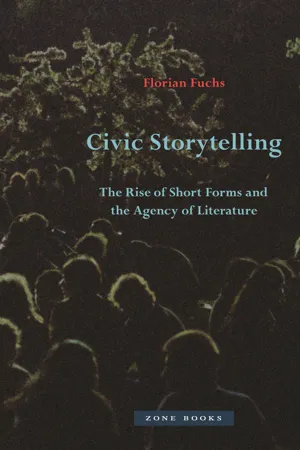
- 320 pages
- English
- ePUB (mobile friendly)
- Available on iOS & Android
About this book
A deep history of storytelling as a civic agency, recalibrating literature’s political role for the twenty-first century
Why did short narrative forms like the novella, fable, and fairy tale suddenly emerge around 1800 as genres symptomatic of literature’s role in life and society? In order to explain their rapid ascent to such importance, Florian Fuchs identifies an essential role of literature, a role traditionally performed within classical civic discourse of storytelling, by looking at new or updated forms of this civic practice in modernity. Fuchs's focus in this groundbreaking book is on the fate of topical speech, on what is exchanged between participants in argument or conversation as opposed to rhetorical speech, which emanates from and ensures political authority. He shows how after the decline of the Ars topica in the eighteenth century, various forms of literary speech took up the role of topical speech that Aristotle had originally identified. Thus, his book outlines a genealogy of various literary short forms—from fable, fairy tale, and novella to twenty-first century video storytelling—that attempted on both "high" and "low" levels of culture to exercise again the social function of topical speech. Some of the specific texts analyzed include the novellas of Theodor Storm and the novella-like lettre de cachet, proverbial fictions of Gustave Flaubert and Gottfried Keller, the fairy tale as rediscovered by Vladimir Propp and Walter Benjamin, the epiphanies of James Joyce, and the video narratives of Hito Steyerl.
Frequently asked questions
- Essential is ideal for learners and professionals who enjoy exploring a wide range of subjects. Access the Essential Library with 800,000+ trusted titles and best-sellers across business, personal growth, and the humanities. Includes unlimited reading time and Standard Read Aloud voice.
- Complete: Perfect for advanced learners and researchers needing full, unrestricted access. Unlock 1.4M+ books across hundreds of subjects, including academic and specialized titles. The Complete Plan also includes advanced features like Premium Read Aloud and Research Assistant.
Please note we cannot support devices running on iOS 13 and Android 7 or earlier. Learn more about using the app.
Information
Table of contents
- Cover Page
- Frontispiece
- Title Page
- Copyright Page
- Epigraph
- Contents
- Introduction: Two Ontologies of Prose Literature, Short Form versus Novel
- I. The Ars Topica, Its Disappearance, and Its Afterlife
- II. After the Ars Topica: The Failed Return of the Fable in Modernity
- III. Form: The Novella and the Agency of Short Narrative Forms
- IV. Argumentation: The Proverb as Micronarrative Agency
- V. Perception: The Fairy Tale as Topical Archive
- VI. Epiphanies, Enacted Stories, and the Praxeology of Short Forms
- VII. Coda: Civic Storytelling and the Postliterary Image Life
- Acknowledgments
- Notes
- Works Cited
- Index